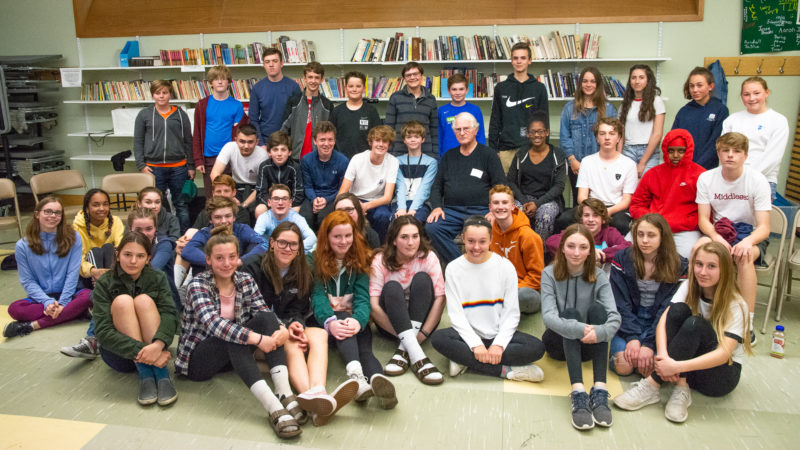Holocaust survivor Charles Rotmil shares story with middle schoolers
Eighth graders welcomed guest speaker Charles Rotmil to Waynflete on May 7. Originally from the Alsace-Lorraine region, Mr. Rotmil lost family members to the Holocaust. He was hidden by Catholic priests and escaped persecution by the Nazis. He shared his story with the eighth grade along with a slideshow of news stories, photographs, and original artwork.
Prior to Mr. Rotmil’s visit, eighth graders were immersed in an interdisciplinary study of the Holocaust in their English and history classes. Along with a study of the historical events of World Wars I and II and the rise of Nazism, they have been reading stories about the time period, including the powerful memoir “Night” by Elie Wiesel. Mr. Rotmil’s visit allowed students to connect their learning to the personal story of a Maine resident.
Students were deeply moved by Mr. Rotmil’s visit:
“I will never forget listening to what Mr. Rotmil had to say. His voice will definitely be a ring of truth for me.”
“His story was fascinating beyond words and his presence made the whole room feel better. His talk was informative, interesting, and captivating. When he played his harmonica, I truly felt touched. The song was beautiful. Mr. Rotmil’s talk is the thing I’m taking away from this unit that I will keep with me forever.”
The goal of the interdisciplinary approach to the eighth-grade Holocaust unit is to inspire and prepare students to use their voices as caring and responsible citizens of the world. In students’ words:
“Hearing from [Mr. Rotmil] really affected me and made me want to let people know about what Jewish people had to experience. I would speak out on this to people who don’t fully understand what happened because I think everyone should know about the impact of the Holocaust.”
“Learning about the Holocaust has made me more aware of hate groups active today. Knowing what happened in the past makes me want to prevent it in the future. I think that if people know about how terrible the Holocaust was, they will be more likely to stand up and say something in the future. I hope I would.”
“It makes me want to speak up more, take more action, and think more about my surroundings, and what people around me have been through.”
“I feel that learning about these injustices made me a better person. It gave me a sense of duty that I need to achieve.”



